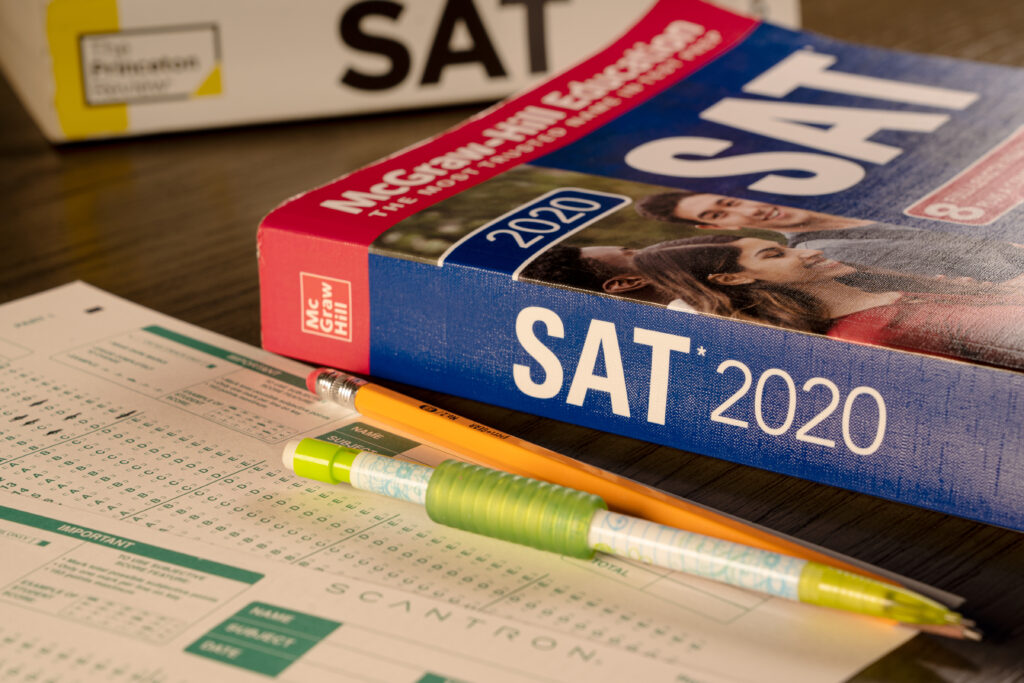
Credit: ShutterStock
When the Covid-19 pandemic seriously disrupted the ability of students to take SATs and ACTs, many colleges and universities, including the University of California and California State University systems, either made standardized tests optional or dropped the requirement for admissions. Now, Dartmouth is the first to say that either SATs or ACTs will be required again for fall 2024 applicants, and a few other universities, including Harvard, are following this path.
Even before the pandemic, equity concerns were often cited as reasons these tests should not be required; both the UC and Cal State systems have maintained that they will continue to be SAT- and ACT-free.
To learn what university students think about the potential return of standardized testing, EdSource’s California Student Journalism Corps asked them the following questions at seven California colleges and universities:
“While UC and Cal State have said there are no plans to change their test-free policy, in place since 2020, do you think standardized tests such as these should return? Why or why not?”
Below are their responses.
(Click on the names or images below to read what each person had to say.)
Alex Soriano opposes the return of standardized tests, suggesting that there should be “more holistic ways” to evaluate students equitably. However, he is unsure of what an alternative might look like.
“In my opinion, based on evaluating different skills … I feel like (the test) doesn’t really evaluate knowledge on the same level,” he said. “I think bringing back standardized tests would bring back [equity] issues.”
To showcase the disparity of standardized test scores, Soriano references EdGap.org. The website features a map that displays the median household income of neighborhoods and the average SAT and ACT scores in those areas. The map indicates that high-income areas exhibit well-performing test scores in comparison to those from low-income areas.
“Coming from the upper-middle-class area of San Diego, my area was super high (in SAT and ACT scores), and it made sense,” Soriano said. “A lot of my friends could afford to pay for the extra tutoring; they could pay for a counselor that can come in and work on standardized test prep, and not everybody is able to afford those services.”
By Jazlyn Dieguez
“I think they should (return) just because I think it’s a good (performance assessment) other than grades for colleges because some high schools inflate their GPAs,” Rodriguez said. “It’s kind of a middle ground.”
After taking the SAT exam once, Rodriguez was satisfied with the “OK” score he received since he wasn’t planning to apply to any universities with a high SAT requirement. Instead, he opted to attend Modesto Junior College and has since transferred to San Diego State University.
“It’s weird because I know some people are not great test-takers and some students haven’t had the luxury of being in certain classes or receiving tutoring,” he said. “Some people were spending crazy amounts of money to have a good SAT and ACT score. I wasn’t one of those guys, I was just happy with whatever I got.”
By Jazlyn Dieguez
“No, I do not believe standardized testing should be reinstated,” Kattaa said. “The SATs are a disadvantage for most college applicants.”
Kattaa believes that “a student’s GPA, extracurriculars, admission essays, and letters of recommendation speak more (about) a student’s academic and personal achievements. They are more than just one test.”
Kattaa also believes that the absence of required standardized tests has increased diversity on college campuses.
By Aya Mikbel
“I believe that standardized tests such as these should not return due to the amount of pressure it puts onto students and the possible disadvantage regarding admission status,” Naseer said. However, she sees the advantage of the tests being provided “for those who want to show more dedication.”
She understands that colleges and universities are looking for “well-rounded students; academics certainly play a greater role when applying to college.”
But Naseer is concerned that when students don’t have high scores, “It may cause them to be looked down upon, (and) there are other factors such as general academics or volunteer service that should be prioritized as well.”
Naseer continued, “As a student who didn’t take these tests, I feel that doing so allowed me to focus and improve on other areas of my studies/experience.”
By Aya Mikbel
“No, I don’t think these tests should be brought back,” Garcia said. “I think there should be a different type of examination process. I didn’t take the ACT or SAT and got in (to UCLA). I think they don’t really evaluate the student as a whole.”
Garcia added that she thinks the tests don’t “give a very good evaluation of students, academically speaking.”
By Delilah Brumer
“We got rid of the SAT and ACT requirements a few years ago, and I honestly think that it’s more fair for people to not have (these tests) as a requirement,” Wolin said.
Wolin said she was able to get SAT tutoring, but it was expensive for her family, and she’s “very aware that not everyone can afford that.”
“While I did have a leg up, I know that it wasn’t fair to everyone,” Wolin said. “I think abolishing that requirement was a step in the right direction. I wish I had a better solution for a replacement, but I don’t. At least now, I know they’re focusing on a more holistic approach, which I think is more fair.”
By Delilah Brumer
“I think it depends on the college,” Bar said. “For a school like Cal Poly, where a majority of what they are going to take into account is your GPA and test scores, it is different from a private college where they are going to take a more holistic approach.”
As a student who participated in examinations for his admission into Cal Poly, Bar said that he believed the university could benefit from reinstating test scores in exams, to add more depth to applications.
“Right now, Cal Poly doesn’t use essays, so all the application really consists of is biographical information and GPA,” Bar said. “I think there should be another component, like SATs or ACT scores. I think for a school that requires just such minimal information about the applicants, they should require it.”
By Arabel Meyer
“They should be test-free because it makes admissions more equal, and all higher SAT scores usually come with higher preparation,” Martinez said.
Martinez said she hopes UCs and CSUs would not require test scores because she finds inequality when colleges use standardized test scores for admissions. The SAT takes preparation and financial resources that not all students can access, according to Martinez.
“I came from a low-income community and rural community,” she said. “There was no such thing as SAT prep.”
Martinez only realized the importance of SAT preparation when her peers began to discuss private tutoring and other resources they had access to. She hopes that remaining test-free will provide greater opportunities for students, regardless of their financial position.
By Kelcie Lee
“Having it is a good idea,” Chiu said. “However, the SAT, when you take it, you can learn how to get a good score. So in a way, it’s almost rigged.”
She had mixed feelings when it comes to the SAT and ACT; she understands the purposes of assessing students, but also acknowledged flaws of using standardized tests for admissions.
“Even if you do get a good score, it doesn’t necessarily mean you’re meant to go to one of these top schools.”
She believes a better option would involve the UCs making their own test that is “more knowledge-based,” as opposed to the memorization involved in prepping for the SAT.
“Ultimately, it’s a weird in-between of whether you should have it or not,” Chiu said.
By Kelcie Lee
“I personally think the tests aren’t necessary or helpful. I don’t think they are proof of intelligence.”
Williams transferred from Berkeley City College to Sonoma State in 2023. She did not have to take a standardized test to get admitted.
“I know people in my life that have told me about their experiences, and that they felt that the test was not concrete proof of whether or not they are intelligent.”
By Ally Valiente
Bernales said that he does not support standardized tests making a return because “the tests favor those that have access to more resources.”
He is dissatisfied with the inequity. “Families with money can get tutors to help educate their kids to do better and can afford for them to take it multiple times to improve, while some families may not be able to afford it,” Bernales said.
“Along with that,” he continued, “the [high] school’s funding also can affect the results of the test since a better funded school tends to have higher scores.”
By Ally Valiente
“No, because I think a lot of people just aren’t good test takers, and a lot of it’s just really generalized knowledge,” Mlouk said.
Mlouk said she did not get a good score on the SAT, but she had a high GPA, which helped her.
“I consider (myself) a pretty smart person, but the test does not reflect that at all,” she said.
Mlouk said standardized tests like the SAT and ACT aren’t helpful for people who are not good test takers.
“It would limit their chances even though they could excel at that school,” Mlouk said.
By Ashley Bolter


